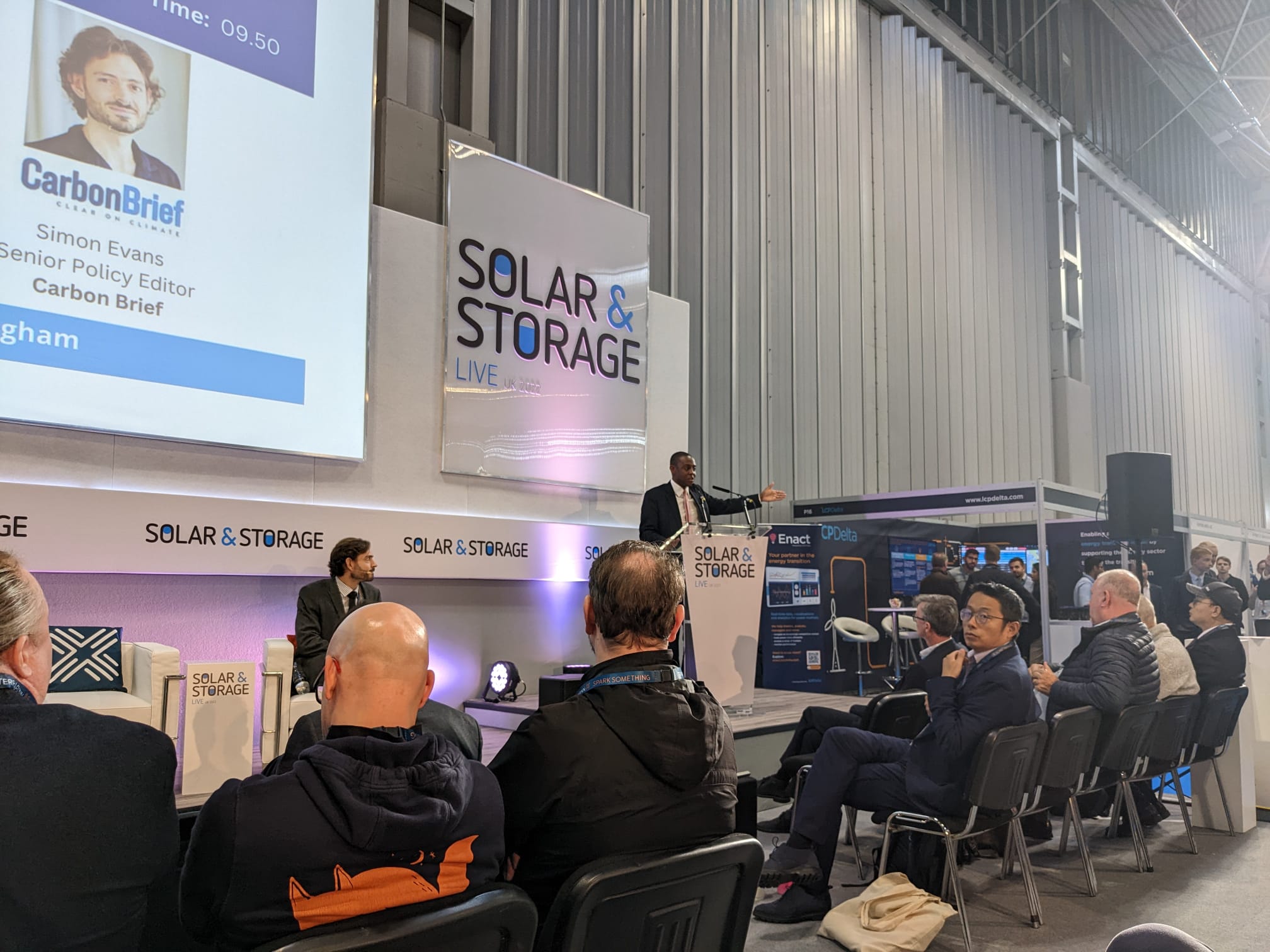
Bim Afolami, Conservative MP for Hitchin and Harpenden speaking at Solar & Storage Live at the NEC in Birmingham. Image: Sean Rai-Roche/Solar Media.
Don’t get disheartened or distracted by the current state of UK political discourse on solar PV. Instead, focus on the strong underlying growth trends of the industry, high public support for UK solar and continued developments in PV technology.
Those comments were issued by Chris Hewett, chief executive of Solar Energy UK, during his opening remarks to the Solar & Storage Live 2022 trade show, held this week at the NEC in Birmingham.
More than 1,000 delegates had already arrived by 9:30am today, with 13,000 expected to attend the UK’s biggest solar trade show over the next week. Members of the Solar Media team are working across the event and at our stand (E64) to give you all the latest and up to date coverage of the event.
Sean Willis, managing director of Terrapinn Holdings, which runs the event, introduced Hewett who kicked off proceedings with an optimistic speech that called for continued work from the UK solar sector despite recently political obstacles.
The growth of solar in the UK was, Hewett said, “driven by science and economics” as he lamented politics “getting in the way”.
Nonetheless, Solar Energy UK expects more than 1GW of solar PV to be deployed in the UK this year alone and Hewett said residential and commercial installations had increased two-fold on last year.
“Most parts of the political spectrum support our industry,” said Hewett, adding that media outlets such as “the Times, Telegraph and even GB News support more solar” as he called on attendees to ignore the current political drama.
After a brief introduction from Simon Evans, senior policy editor of the Carbon Brief, the audience at the opening remarks to the conference also heard from Bim Afolami, Conservative MP for Hitchin and Harpenden.
Afolami, who defended the Conservative’s record on the environment and solar, said there was still strong support for solar PV within the Conversative parliamentary party, despite doubts at the top, as he called for the sector to “move further and faster”.
He pointed to a number of obstacles to greater deployment in the UK, which did not include the Prime Minster. Firstly, he said there were numerous cases of NIMBYism in the UK through which local politics and opposition have scuppered plans for nearby solar parks.
“The primary reason [for this NIMBYism] is that we’re not giving people any benefit from the solar projects near them,” Afolami said. “We need to change the system and developers need to work hard to give direct incentives to those living near solar farms.”
The MP called for lower or even free electricity bills for residents near solar farms, arguing that such direct benefits will drum up support for solar PV among the public and will help with the current cost of living crisis. Support among the UK population for solar is already north of 80%.
Next, Afolami took aim at the UK’s grid system. He said underinvestment had led to long interconnection queues, with most new projects given a connection date of 2028 or later. He said the government needed to “work harder and give more investment into the national grid to enable more clean power” but that wholesale reforms were also needed to the way distribution network operators (DNOs) worked.
Regulator Ofgem is already looking at DNO reform and has released what it has said is a “landmark five year vision” as part of the draft plans for the next price control period.
Finally, the MP rubbished the claims of many of his own party as he criticised recent reports that environmental secretary Ranil Jayawardena is looking to redefine land categories to make the development of ground-mount assets harder.
Jayawardena is said to be considering extending the definition of Best and Most Versatile (BMV) land to Grade 3B. Currently the majority of solar farms are developed on land that is designated as 3B within the Agricultural Land Classification (ACL) scheme.
Afolami slammed it as a “bad proposal” and said that arguments around food security were absurd given that just 0.4% of UK farmland would be covered if every single solar PV project currently proposed were built today. He did, however, say that more needed to be done to ensure that land used for solar projects was still suitable for farming if the plants were ever removed.
